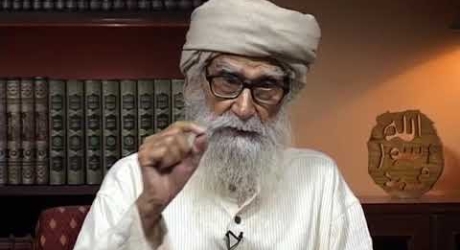When the Prophet saw a person performing ablutions and wasting water carelessly, he asked him to not do so. There will be accountability for this act. The person asked: "Even if I am performing ablutions next to a flowing river?" When I perform ablutions with less water, I should use it carefully. But when there is a lot of water beside a river, should I still not waste it? The Prophet replied: نَعَمْ، وَإِنْ كُنْتَ عَلَى نَهَرٍ جَارٍ (Sunan Ibn Majah 425) "Yes, even when you are performing ablutions next to a flowing river." What is the style of the Hadith? An incident is taken as a point of reference and a universal principle is taught from it. Here, the Prophet spoke in reference to ablutions. But it has a universal aspect. While training the mind of a person, a particular reference is given.
The Prophet once saw a man performing ablutions. He was wasting a lot of water. He was using water carelessly, even when he could use less of it. The Prophet asked him to not do so. He explained that this was wastage. Unnecessary expenditure is wastage, which is considered very wrong in Islam. If God gives you money and you waste it, the Quran says: إِنَّ الْمُبَذِّرِينَ كَانُوا إِخْوَانَ الشَّيَاطِينِ. "The squanderers are the brothers of Satan." (17:27)
If God gives you money and you do parties and functions to make people happy, this is then wastage, which makes you Satan's brother. God gives you money to fulfil your real need. Spending money beyond anything that is your real need is wastage, which is a satanic act. When the Prophet saw a person performing ablutions and wasting water carelessly, he asked him to not do so. There will be accountability for this act. The person asked: "Even if I am performing ablutions next to a flowing river?" When I perform ablutions with less water, I should use it carefully. But when there is a lot of water beside a river, should I still not waste it? The Prophet replied: نَعَمْ، وَإِنْ كُنْتَ عَلَى نَهَرٍ جَارٍ (Sunan Ibn Majah 425)
"Yes, even when you are performing ablutions next to a flowing river." What is the style of the Hadith? An incident is taken as a point of reference and a universal principle is taught from it. Here, the Prophet spoke in reference to ablutions. But it has a universal aspect. While training the mind of a person, a particular reference is given. One style is to say something in an absolute or general sense. This does not require a point of reference. But when you train a person's mind, you have to give a point of reference. This method will address people's minds. Here, the Prophet used ablutions as a point of reference and taught a general principle based on it. That principle is to refrain from wastage. Wastage is doing something in excess. In ablutions, we have to refrain from using excess water. In your entire life, you have to save yourself from wastage in every matter.











